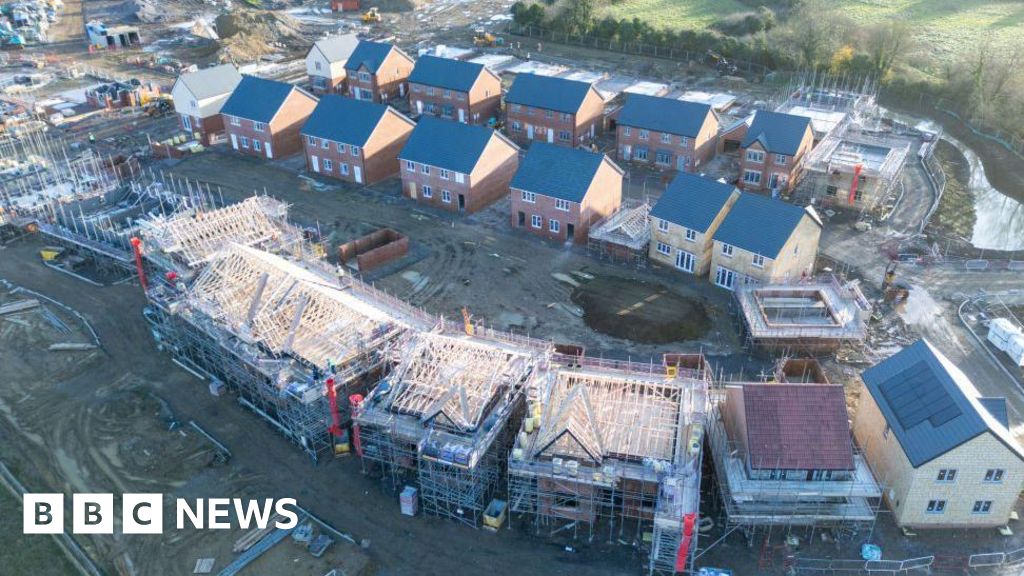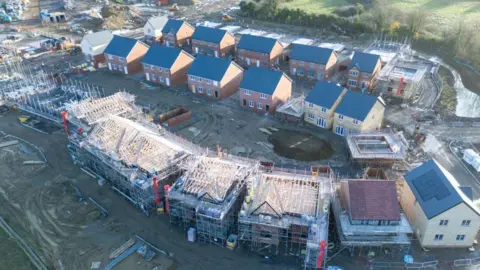
 Getty Images
Getty ImagesThe government will be given the power to bypass council planning committees in England under plans to make it easier to build new homes.
Officials will be allowed to speed up the process by rubber-stamping proposals that comply with existing council strategies without getting permission from a committee.
Deputy Prime Minister Angela Rayner said the planning process was acting like a “drag anchor” on aims to deliver more housing and vowed to bring a “sweeping overhaul” of the local committee system.
House builders broadly welcomed the streamlining, but councils said a better way would be to give them more resources.
A Conservative spokesman said the government’s plans are “nothing more than a list of empty promises which will do nothing to ensure that Britain has the housing it needs where it needs it”.
Earlier this week, Prime Minister Sir Keir Starmer restated his pledge to build 1.5 million new homes by 2029 despite accepting it could be “a little too ambitious”.
The fast-track planning process would apply to housing proposals and associated infrastructure such as schools, if they had already been broadly agreed as part of local development plans where councils set out a strategy for land use in their areas.
If the proposals “comply” with these plans, the government said, they could “bypass planning committees entirely to tackle chronic uncertainty, unacceptable delays and unnecessary waste of time and resources”.
Rayner said building more homes and infrastructure meant “unblocking the clogged-up planning system that serves as a chokehold on growth”.
“Building 1.5 million homes over five years means tackling the housing crisis we inherited head-on with bold action,” she added.
According to government planning statistics, between January and March 2024 only 19% of major applications were determined within the statutory 13-week period and only 38% of minor applications were determined in the statutory eight-week period.
The push for more homes may be popular among those voters struggling to get on the housing ladder.
But even small housing projects are often opposed by people living nearby for a variety of reasons, including concerns about the impact on local schools, doctors, roads and parking.
Taking away the option for local people to prevent a development by making a case at a planning committee may result in a political backlash, particularly in rural areas.
Labour has already angered farmers by bringing agricultural land within the scope of inheritance tax, and needs to nurture support outside cities if it is to maintain political strength.
The Local Government Association (LGA) said that, far from planning delays being to blame for holding up house building, a million proposed homes had in fact been agreed in principle by councils in their local strategies but developers had not brought forward plans.
Councillor Adam Hug, housing spokesperson for the association representing councils, said local authorities and communities “need to be full partners in tackling the housing crisis together”.
He added this could be achieved with “new development supported by the infrastructure needed to make communities thrive and proper consultation and engagement that can help ensure local people are able to benefit”.
 EPA
EPAThe Home Builders Federation (HBF) said that while “democratic involvement and oversight of planning” was a “fundamental element of the process” it could be “very frustrating for applicants to have the principle of development debated over and over again”.
The housing ministry also hopes to streamline the strategic planning process and introduce a requirement for better training for members of planning committees. A Planning and Infrastructure Bill will be introduced next month.
Many in local government and the housebuilding industry believe the now-mandatory target of 1.5 million new homes by 2029 will be impossible to meet.
A Conservative spokesman said the government had “set a house building ‘target’ that the OBR has already said they can’t achieve because of their own Budget”.
The HBF agreed with the LGA that councils needed more planning resources and also called for more financial help for young home buyers.
Kate Henderson, the National Housing Federation’s chief executive, said the industry needed a “significant boost in funding for social rented homes and equal access to building safety funding for social landlords” at the upcoming spending review “as part of a package of long-term measures to help the social housing sector rebuild its capacity after decades of cuts”.
Next week the government will announce further reforms by updating England’s planning rulebook, the National Planning Policy Framework.




